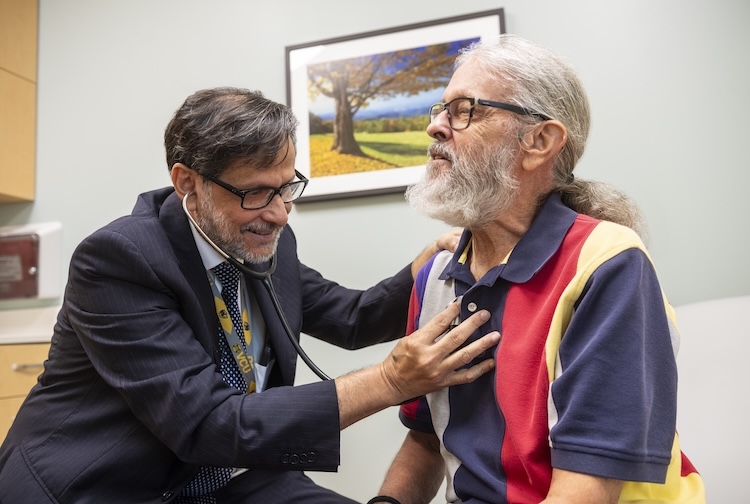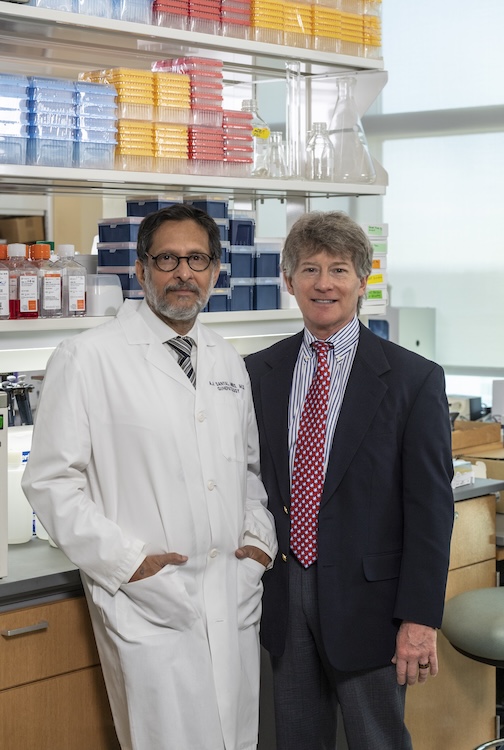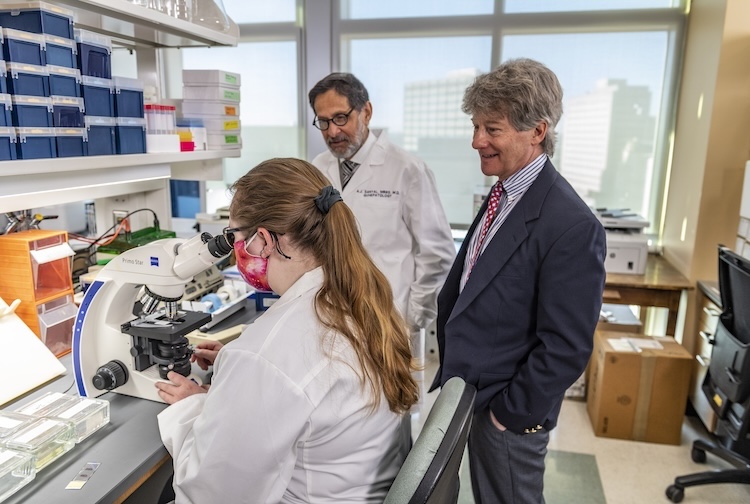VCU liver institute brings world-class research directly to patients with advanced care
Linking research to patient care, the VCU Stravitz-Sanyal Institute for Liver Disease and Metabolic Health creates innovative ways to tackle liver disease in Virginia and beyond.
August 25, 2025 VCU hepatologists like Arun Sanyal, M.D., director of the liver institute, are leading dozens of clinical trials for patients with liver disease. (Allen Jones, Enterprise Marketing and Communications)
VCU hepatologists like Arun Sanyal, M.D., director of the liver institute, are leading dozens of clinical trials for patients with liver disease. (Allen Jones, Enterprise Marketing and Communications)
By A.J. Hostetler
The liver is the king of multitasking, handling some 500 body functions that keep the human body going.
It breaks down toxins, aids digestion and helps absorb fats and fat-soluble vitamins. It ensures the health of other vital organs, like the heart, brain and kidneys.
While people typically notice when those vital organs are failing, most people with liver disease don’t even know they’re sick until it’s too late.
About a third of people in the United States have some form of liver disease and cases are rising, fueled by the twin epidemics of obesity and diabetes. These, along with alcohol-associated liver disease and viral hepatitis, make liver disease the ninth leading cause of death in the U.S. Liver disease is also responsible for more than two million deaths worldwide each year.
Even though so many are affected, there are few treatments available and liver transplants are often a last resort.
 From left to right: Arun Sanyal, M.D., director of the liver institute, and R. Todd Stravitz, M.D., VCU Health hepatologist and philanthropist. (Allen Jones, Enterprise Marketing and Communications)
From left to right: Arun Sanyal, M.D., director of the liver institute, and R. Todd Stravitz, M.D., VCU Health hepatologist and philanthropist. (Allen Jones, Enterprise Marketing and Communications)
That’s why the Stravitz-Sanyal Institute for Liver Disease and Metabolic Health at Virginia Commonwealth University was set up nearly four years ago – to find new ways to prevent, treat or reverse liver disease and help people all around the world to live longer, healthier lives.
Co-founder and philanthropist R. Todd Stravitz, M.D., a VCU Health hepatologist and former medical director of liver transplant at VCU Health Hume-Lee Transplant Center, says the idea of a liver institute came to him when he was visiting his mother as she was dying of brain cancer. “One of my last conversations with her related to an expansion of [his family’s] foundation’s aims to include medical research. The bulb in my head went off.”
Many phone calls and meetings later, the Stravitz-Sanyal Institute was up and running under the direction of his colleague, VCU’s Arun J. Sanyal, M.D., the No. 2 hepatologist worldwide, according to ScholarGPS.
“The heart of this endeavor is the ability to transform the lives of people with liver disease around the world,” Sanyal said. “With every new finding, you can impact a million people. That's what makes research so powerful.”
Sanyal is growing a team of clinician-researchers at VCU and its affiliated academic health system, VCU Health, who are internationally recognized for their work. One of his recruits, pediatric hepatologist Saul Karpen, M.D., Ph.D., supervises the institute’s growing research efforts as chief scientific officer. Juan Pablo Arab, M.D., was recruited as director of alcohol sciences.
In the past year or so, VCU hepatologists’ research led to the first treatment for patients with fatty liver disease, one of the most common liver diseases, and discovered that 13% of patients with dementia may instead have a kind of “brain fog” from cirrhosis that can be easily treated with antibiotics. Others authored treatment guidelines for chronic liver disease as well as screening procedures for liver disease in infants to be used by pediatricians worldwide.
But VCU hepatologists aren’t just writing the guidelines to diagnose and treat liver disease. They lead international clinical trials to find new treatments and bring those opportunities to VCU Health patients. Between June 30, 2024, and July 1, 2025, VCU hosted 56 clinical research studies specifically for hepatology patients.
“There’s almost no liver disease for which we don’t have a clinical trial,” said the institute’s chief clinical officer, Richard Sterling, M.D., who developed the FIB-4, an index still used to gauge liver health.

Research focused on new ways to prevent, treat or reverse liver disease is at the heart of the work pursued at the VCU Stravitz-Sanyal Institute for Liver Disease and Metabolic Health. (Allen Jones, Enterprise Marketing and Communications)
VCU Health is expanding its footprint in Richmond, Virginia, with two new facilities – ensuring patients have access to high-quality liver care based on the latest research available. A 39-bed inpatient unit opened in April to provide comprehensive care for liver transplant patients at VCU Health Hume-Lee Transplant Center. Later this fall, a new outpatient clinic will open, offering patients a centralized space for multiple specialties involved in liver and metabolic health.
On the horizon for 2026, the institute plans to open a new pre-clinical imaging center. The center’s state-of-the-art technology will enhance visualizations of the physiological processes for multiple organs simultaneously – improving our understanding of the whole human body “through the lens of the liver,” Sanyal says.
The institute is also supporting international efforts to find better ways to diagnose and treat liver disease by allowing researchers around the world to access and study liver samples stored at a growing biorepository. For one project, data scientists use those samples to track how sick livers change over time, helping to answer new questions about liver disease.
While Richmond may be a small dot on a global map, Sanyal sees how his team of VCU clinician-researchers are making an impact for millions of lives.
“I'm incredibly proud of what we have accomplished, and we're only just getting started,” Sanyal said. “We are helping create a global community to shift the paradigm for liver health, so that our patients, both in Virginia and beyond, can get the care they need faster.”
A leader in the fight against liver disease; find out what makes VCU’s Arun Sanyal an uncommon hero.




